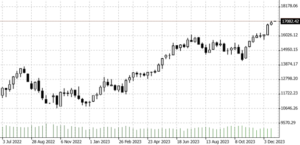

27.12.2023 – For the bulls, a good stock market year is approaching the finish line. No wonder: on Wall Street and in Europe, it is now a foregone conclusion that the Federal Reserve will cut interest rates again next year. And sooner rather than later. Reason enough for us to take a closer look at this unexpected event. The financial giant BlackRock recently warned of a disappointment.
Optimism still prevails among the big names. Goldman Sachs, for example, expects an interest rate cut of 25 basis points from March to May, followed by quarterly steps. This would reduce the key interest rate from the current 5.25 to 5.5 to 4.0 to 4.25 by the end of the year. Bank of America also sees the first cut of 25 points in March and a total cut of 100 basis points in 2024. The bulls would like to see more cheap money.
Unexpectedly high interest rates
However, the two BlackRock experts Wei Li and Alex Brazier are swimming against the tide. In the “2024 Global Outlook”, they recently addressed the risk that hopes of an interest rate cut will be disappointed. In their outlook, they concluded: “Higher interest rates and greater volatility will define the new regime.” While most investors are already expecting an interest rate cut in the first quarter, the two experts are assuming a mid-year cut at best – if at all.
High-tech shares in particular are likely to be hit by a possible interest rate shock in the coming year. This is because young start-ups often live on credit, and the interest rate is also included in the discounted cash flow valuation method – the lower the interest rate, the higher the value of the company. As a result, the stock market could see a sharp downturn for the time being, here the Nasdaq 100 in the weekly chart. The index has marked a new record high in a nice Santa rally.

Quelle: Bernstein Bank GmbH
The markets are wavering between hopes of a soft landing and fears of recession,” the BlackRock analysis continued. There are also geopolitical supply bottlenecks, an ageing population and the transition to a low-emission economy – this is leading to lower growth and inflation above the central banks’ targets.
Problems for bonds
The experts’ specific recommendation: investors should steer clear of bonds with longer maturities and opt for short or medium-term maturities. Above all, the rising US debt burden is a reason to avoid long-term government bonds. If interest rates remain close to 5 percent, Washington will spend more on interest payments than on healthcare benefits in the coming years. This will probably lead to entrenched inflation and faltering growth. All in all, the risk of higher inflation remains. And this will prevent interest rate cuts.
The fund managers also downgraded the longer-term strategic assessment for equities from industrialized countries to “neutral”. This is because valuations are too high and the economic outlook is weak. The exception is artificial intelligence stocks, which remain overweighted.
This could lead to increased uncertainty in 2024. This creates a volatile environment in which active managers can play to their strengths, the strategists added. We add: Above all, a volatile environment brings good profits to traders with the right instinct. Our conclusion: BlackRock naturally thinks primarily in the long term with a horizon of around five years. However, the interest rate disappointment could indeed set the pace on the stock market in the coming year – and also determine events in the short term. Furthermore, high yields on bonds have already rubbed off on the stock market this year. We are excited to see what lies ahead – and wish you successful trades and investments!
________________________________________________________________________________________________________________________________________
The content of this publication is for general information purposes only. In this context, it is neither an individual investment recommendation or advice nor an offer to purchase or sell securities or other financial products. The content in question and all the information contained therein do not in any way replace individual investor- or investment-oriented advice. No reliable forecast or indication for the future is possible with respect to any presentation or information on the present or past performance of the relevant underlying assets. All information and data presented in this publication are based on reliable sources. However, Bernstein Bank does not guarantee that the information and data contained in this publication is up-to-date, correct and complete. Securities traded on the financial markets are subject to price fluctuations. A contract for difference (CFD) is also a financial instrument with leverage effect. Against this backdrop, CFD trading involves a high risk up to the point of total loss and may not be suitable for all investors. Therefore, make sure that you have fully understood all the correlating risks. If necessary, ask for independent advice. CFDs are complex instruments and are associated with the high risk of losing money quickly because of the leverage effect. 68% of retail investor accounts lose money trading CFD with this provider. You should consider whether you understand how CFD work and whether you can afford to take the high risk of losing your money.7
